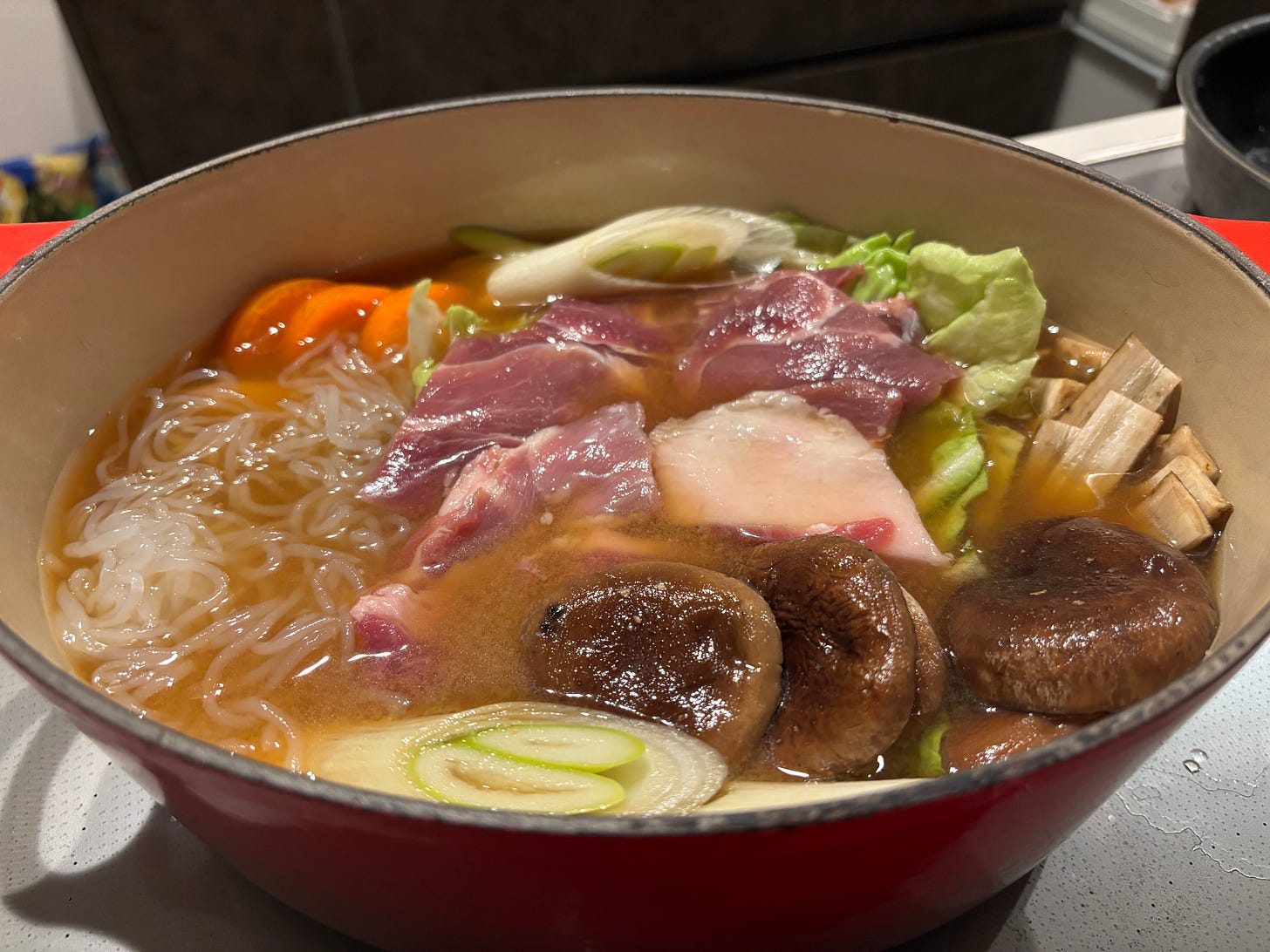Our grey and dusty bend in the highway comes to life only once a month. The morning of the third Saturday.
A line of colorful banners suddenly flutter on both sides of the road to catch the attention of drivers intent on speeding past our shuttered town. “Today is Marché! Handicrafts, Produce! Wild Boar Meat!”
While few cars ever stop, Marché is really about communion within our own valley. Rain or shine, this is the one day when even the hermits venture forth.
Newer residents like us find out we have scores of neighbors we never knew we had. The locals–hermits and non-hermits alike–all know us already, including likely our names, social security numbers, and college GPAs. This is boonesville Japan, baby, and scoop travels fast about Outsiders.
Ten A.M. is Marché start time, but by 9:00 a line of octogenarians has already formed to wait outside the doors of the old wooden Community Center that houses the event. The weed-covered parking lot is filled with their tiny spotless cars. The air is alive with the latest gossip, laughs, and hellos and how have you beens followed by innately wired bowing in all directions.
Marché is a needed check-in for people who, let’s face it, have likely known each other since they were all enrolled 75 years ago in the same kindergarten down the road.
Like most organized activities in Japan, there are several identifiable groups in attendance, each trying to out hustle the others.
Outside are the partying type food vendors, mostly older male and often already tippling before start time. These are the social animals, guys who come for the small talk, and who take joy in handing out free samples to anyone whether they want them or not. A gregarious younger man comes with a taco truck, though his idea of tacos comes from a place very far from Mexico. An older fellow grills tender (as well as gristly) pieces of boar on open flame, while a favorite guy of mine, maybe in his fifties and always rocking Ray Bans, grills sticks of chicken and farm fresh veggies that get dipped in his “secret recipe” tangy sauce. A toothpick dangles from his lips as he yacks incessantly. It somehow never falls.
Inside the Marché we find mostly elderly ladies, all actually working, unlike the jabberers out front. Three surprisingly small ladies team-run the cash register by the door. They tirelessly scramble around the Marché’s tables pricing, tagging, helping customers, and wrapping each individual purchase in newspaper carefully. In the back left corner of the room, we find the more “hippie” seeming ladies who sell remarkably unrelated chotchkes like coin purses, macrame, glass beads, photo frames, beeswax candles, ceramic hippos, bookmarks, and tiny vases for single dry flowers. One woman I’ve nicknamed Janis for her big raspy voice and wild, loose-permed hair.
I’d go out drinking with Janis if she ever happened to suggest.
In the middle of the room are three long tables stacked with fresh produce. Each is carefully labeled with the farmer’s name. Potatoes by Sato. Snow peas by Moriya. Corn, shiitake, and spinach by S. Yano.
Toru in private is quite dismissive of the produce at Marché. “Overpriced. And clearly the work of amateur farmers,” he says. “These are giveaways–for much less, we get much better [insert any produce] at [insert name of anywhere else].”
Japanese if you don’t know can be withering regarding the efforts/character/motivations of other Japanese.
One young lady I like quite a bit. She laughs easily and has a big smile. Her husband died unexpectedly and after getting past some trepidation she decided to take on the handmade tofu business he left behind. She knew nothing of making tofu but enrolled in some classes and now after several years her little artisanal operation is humming. She comes alone to Marché to give tastes and to slowly expand her client base. She always sells out quick.
Toru says her tofu is not great. It’s overpriced too, it seems.
I think it’s delicious. Milky, creamy, little spoonfuls that need no soy sauce or any other embellishments or adjustments. This tofu is…melty! I told her where Frog’s Glen is located, and she knew the spot. She told me her tofu farm is about three kilometers away at the end of a small walking path that crosses very near our door. “Please stop by. Bring Tera–he’ll love the walk and we are located right in front of the ocean,” she said with a big toothy smile.

I can’t tell the story of our Marché without touching upon the booze makers. They only make makkori, a highly unrefined, unfiltered rice sake. It looks like yellowed milk and is sweet. Koreans often drink makkori, and though I love most anything culinary from Korea, I’m no fan of this stuff. It’s like unfinished, boozy, curdled porridge. Sorry, I don’t think it’s a thing to have a drink and then find small clumps of it in your teeth hours later.
Anyway, the Marché is quite proud of having makkori on offer. Last time I was at the market, I decided to be a good new resident and–damn the curdles–asked for one. The tiny lady at the register raised her eyebrows and said, “You bring a bottle?”
I had not. She bellowed across the room at some teenager, “Masa! Get a bottle for the gaijin. MAKKORI!”
Soon an old plastic Sprite bottle filled with makkori was produced. I took it home but then forgot to even try my purchase. Two weeks later I pulled it out of the fridge and found that gaseous fermentation had continued apace, and would have eventually blown the Sprite bottle apart if I hadn’t remembered to twist open the cap. I had one sip of what was now a foaming mess and got a mouthful of soured yogurt. It was a truly awful concoction that went right down our drain.
One thing we’ve never tried from Marché is the local rice. In early autumn two- or three-kilo bags show up, with the address of the paddy each harks from. I’m not expecting Japan’s absolute best, and as Toru says it will likely be a bit overpriced, but this won’t be the work of amateurs.
I really ought to know what our valley’s rice is like.






The makkori 😱😂 good on you for trying, but the drain does sound like a great place for it 😍
Good to see you writing again Jack. Love your stories. Let us know how the local rice was.